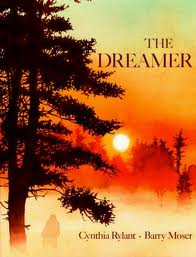 In this book, Lily is a young African American child who enjoys her family and loves creating worlds of her own while painting.
In this book, Lily is a young African American child who enjoys her family and loves creating worlds of her own while painting.All of the illustrations are painted as they would look if a child painted them. I believe it was a good choice, as the illustrator is representing Lily's imagination and they are painted as if they came from Lily's hand. There is a mix of styles throughout the book, starting with a typical child's painting, to some that have a Van Gogh quality to them. She used bold colors to engage the reader and often has inanimate objects or animals acting in a silly, fantastic way. She allows us in to her imagination, showing her painting of trees bowing down to her with hats on and people walking upside down, under the sidewalk. She shows us how she flies through outer space and how the fruits talk and dance around her.
This is a very simple book, with no real story-line throughout it. Each page is a description of the painting it is showing. For example, "When Lily Brown paints fruit at the corner market, it is striped and polka-dotted. It speaks to people then laughs out loud. When people put the fruit in bags to take home, the apples sing all the way there." And then, on the next page, "In Lily Brown's paintings the path to the park becomes a wild-animal living room with antelopes lounging and alligators on the phone. Lily always remembers to draw them a treat." The is no continuity throughout the book, with each page being its own little story. The only time something is referenced more than once is at the beginning and end of the book, Johnson writes about Lily's love for her family that although they come first, she also loves painting.

When I chose this book, I thought I would like it more than I did. It was a fun book to read, but I am drawn to books with a little more substance. Because of its simplistic nature, this would not be a good read aloud story book for deep conversation or to help children with comprehension. This would be a good book to share to boost creativity in children, or allow for students to practice their visualization.


























